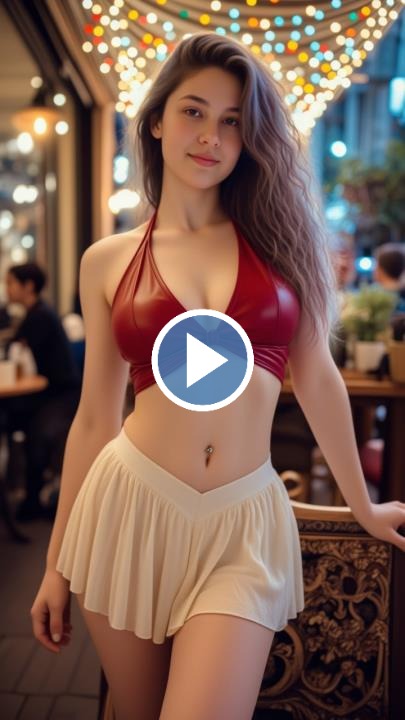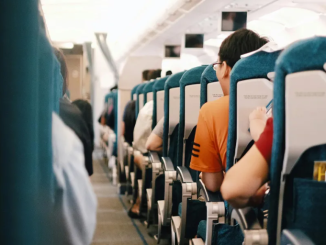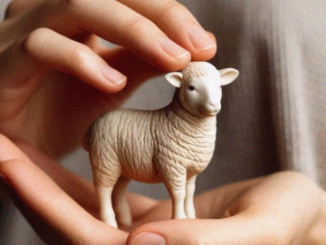
That’s my niece, Lila.
Six years old. Red sweater. Ribbon in her hair like her mom used to wear when we lived up there full-time. She doesn’t remember those years—just the stories we tell her.
The ones that leave out what really happened.
She wanted something simple this year: her favorite bread, a single candle, and to celebrate at the old cabin. We figured, why not? It’s been long enough.
She was so happy. Sat on the bench facing the orchard, holding her little loaf like it was a crown.
But what got me wasn’t the bread. It was the way she smiled.
The exact same smile from the old polaroid I found in Mom’s sewing tin two nights ago. The one labeled: “Lila’s 6th – 1987.”
But that doesn’t make sense.
Because my niece was born in 2018.
And in the photo from ’87… she’s sitting in the exact same spot. Same red sweater. Same candle. Same dimple in her left cheek.
I turned the photo over. Nothing written. I stared at it for a long time, trying to make sense of it. I never mentioned it to Lila, of course. She’s just a kid. Kids don’t understand things like this.
I brushed it off as a strange coincidence. But as I watched her celebrate her little birthday, my stomach tightened.
When we decided to go up to the cabin, it wasn’t just a family trip. It was about closure. It had been years since we left. Ever since that night, none of us wanted to come back.
I could feel my throat closing as I watched Lila blow out the candle. I couldn’t explain it, but something felt off. I tried to push it down. Maybe I was just overthinking.
When we left the cabin for good, it wasn’t because of the usual reasons. It wasn’t a financial struggle or a simple decision. There were no dramatic moments. Just a series of little things that we all chose to ignore. Things we buried under layers of time and silence.
I shook my head, trying to clear the fog in my thoughts. It wasn’t about the cabin or the bread or the smile—it was the quiet tension in the air. The unease that filled the empty spaces.
Lila finished her bread and set the plate down. She smiled up at me, a look of curiosity in her big brown eyes.
“Do you think Grandma will come to visit soon?” she asked.
I froze. My heart skipped. Lila had never met Grandma. She’d passed before Lila was born.
“Grandma’s not coming, honey. She… she’s in a better place now,” I replied, trying to sound convincing.
Lila nodded thoughtfully but then pointed toward the window. “Grandma used to sit by that tree, didn’t she?”
My breath caught in my throat. I could barely speak. I glanced outside at the old oak tree, the one Grandma loved to sit under. I had no idea how Lila knew that.
“How do you know that?” I managed to ask, my voice strained.
Lila shrugged, her little face innocent as ever. “I saw her once. When I was little.”
I blinked, the words refusing to make sense. “What do you mean, sweetie? You were too young to remember.”
She shook her head. “I remember the tree and Grandma’s laugh. It was funny. Like she was singing, but with her mouth closed. I saw her one night when I couldn’t sleep.”
I was too stunned to respond. How could she know all this? I never told her about the tree. I never told her about Grandma’s laugh.
It was too much to ignore.
I suddenly realized just how much I didn’t want to be there. Not just because of the memories, but because of Lila’s strange familiarity with it all.
I got up quickly, wiping my hands on my jeans. “I think it’s time we head back,” I said, forcing a smile. “We’ve been here long enough.”
Lila’s eyes drooped with a touch of disappointment. “But I wanted to stay longer,” she said softly.
I felt a pang of guilt, but I had to leave. Something wasn’t right.
We packed up quickly, and I couldn’t shake the feeling that the cabin was never supposed to be revisited. I thought of the old photo again, the one from ’87. I kept it hidden in my pocket, but it was impossible to ignore. What was going on? How was it possible?
As we drove back down the mountain, I couldn’t stop thinking about Lila’s words. I turned to my brother, who was sitting next to me in the front seat, trying to focus on the road.
“Did you hear her?” I asked, my voice shaky.
He glanced over, confusion written on his face. “Hear who?”
“Lila. She… she said something strange. She said she saw Mom when she was little.”
My brother’s face paled. He didn’t say anything for a moment. Finally, he spoke, his voice barely above a whisper.
“Mom never said anything like that to me. And she didn’t talk about the cabin much after we left.”
We both fell silent, the car ride taking on a heavier tone. I didn’t know what to think anymore. It all seemed so… impossible.
When we finally got back to the house, I felt a strange compulsion to check on Lila. I walked quietly to her room, the door slightly ajar.
She was sitting on her bed, holding the polaroid in her hands. My stomach dropped.
“How did you get that?” I asked, stepping inside the room.
Lila looked up, a soft smile on her face. “It was in the box in the attic. I saw it and thought it was for me.”
I stared at her, unable to comprehend. The photo was the exact same one from the cabin. The one labeled “Lila’s 6th – 1987.”
“You shouldn’t be in the attic, sweetheart. That stuff is… old,” I stammered, trying to remain calm.
Lila shrugged. “I like old things. They feel like stories. Like Grandma told me.”
I stood frozen, trying to make sense of what was happening. How could she have found that photo in the attic? It was the last place anyone would look.
I took the photo from her hands, my mind racing. The more I thought about it, the more pieces of the puzzle seemed to fit, and yet the image was still too blurry to make sense of. There was no explanation for any of it.
“Lila,” I said, sitting beside her, “do you remember anything else about that day? About the cabin?”
She blinked up at me, and for a moment, I could’ve sworn she looked… older. “I remember the light. It was soft, like a blanket. I was happy.”
The words chilled me to my core.
I didn’t know what to do. Part of me wanted to laugh it off. Children have vivid imaginations, after all. But this felt different. Lila wasn’t imagining things. She wasn’t making it up.
That night, I couldn’t sleep. The image of Lila holding that photo haunted me. How was it possible? How could she have known everything?
I couldn’t help but wonder if the cabin was more than just a place. Maybe it had some sort of hold on us—a pull we couldn’t escape, no matter how far we tried to run.
The next morning, I went to the attic. I couldn’t shake the feeling that something important was hidden up there.
I found the old box. The one filled with photos, journals, and faded letters. I sifted through it, carefully, until something caught my eye.
It was another photograph, one I hadn’t seen before. This time, it wasn’t Lila. It was me. A younger version of myself, standing in front of the same oak tree. The same tree Grandma loved. The same tree I had tried to forget.
But what made this photo different was the date stamped on the back: “1987.”
The same year the first photo had been taken.
I stood frozen in place, unable to breathe. The air in the attic suddenly felt thick and heavy, as though something was pressing down on me.
It wasn’t just the cabin.
It was everything.
And then it hit me—the truth I had been avoiding all these years.
Lila wasn’t a coincidence. She wasn’t just some innocent child. She was connected to all of this in ways I couldn’t explain. She had always been a part of our family’s history, even before she was born.
I went downstairs, where my brother was sitting with Lila. I didn’t say a word. I just showed him the photo.
He looked at it, and his face went pale.
“We have to go back,” he said quietly.
I nodded.
It was time to face what we had left behind. It was time to uncover the secrets we had buried for so long.
As we drove back to the cabin, I could feel something in the air—something heavy, but also strangely comforting. Maybe it was time to finally put the past to rest.
When we arrived, Lila skipped ahead, her little hands reaching for the door. I followed closely behind, knowing that whatever happened next, we would finally have the answers.
And maybe, just maybe, we could start to heal.
In the end, it’s not the past that defines us. It’s the way we choose to move forward.






Leave a Reply